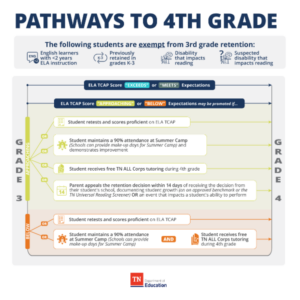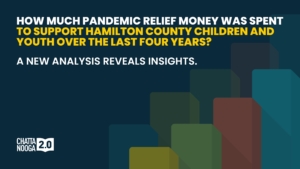The good news? More third graders in Tennessee are reading and writing on grade level than ever before. The bad news? More third graders in Tennessee face the risk of retention because they aren’t reading and writing on grade level than ever before.
Let’s start with the good news first. The Tennessee Department of Education released third grade English language arts achievement data from the latest round of standardized testing, known as TCAP, on Monday, May 22. The growth was unprecedented: more than 40% of third grade students reached or exceeded proficiency—a 4.3 percentage point increase from last year and the highest percentage since Tennessee raised expectations and rigor for students in the mid-2010s.
The story for Hamilton County Schools was similarly rosy, where 40.06% of students in third grade reached or exceeded proficiency—an increase of more than 3.5 percentage points from last year’s testing.
This year is different, however, because a new law went into effect that requires third grade students who do not reach proficiency this year to participate in a summer learning camp and/or tutoring during fourth grade. If a student does not complete the mandated intervention(s) and show adequate growth (either in the summer learning camp or on their fourth grade English language arts TCAP), they face the possibility of retention. While there are some carve-outs for different groups of students, this is a significantly narrower gate for third grade students to pass through—much more so than states with similar laws in place.

For students who are approaching proficiency, their families may submit an appeal directly to the Tennessee Department of Education if they meet one of the following criteria:
- The student received a score at or above the 40th percentile on their spring universal reading screener.
- A catastrophic situation occurred during the days leading up to the TCAP test that impacted the 3rd grade student’s ability to perform on the test. Catastrophic situations include, but are not limited to, a death in the immediate family, loss of a family home, significant medical diagnosis, abuse, physical or emotional neglect, or household dysfunction (e.g., substance abuse, incarcerated relative, mental illness).
Tennessee’s legislators revised the law in the most recent legislative session to allow school districts to submit an appeal on behalf of families; however, this provision does not go into effect until next school year. Some have raised concerns about the accessibility of the current appeals process, including the jargony language it includes (such as “spring universal reading screener”).
Even so, the window for submitting an appeal using the form created by the Tennessee Department of Education opens May 30 and runs through June 30 (though parent or legal guardian has fourteen calendar days to submit an appeal after receiving notification of their third grader’s score).
It goes without saying that only 40% of our third graders are reading and writing on grade level is unacceptable in the long run. But the tremendous growth we have seen, especially for a group of students whose final few months of kindergarten were spent at home thanks to school closures in March 2020, is a sign that we are making progress.
Beginning in the 2020-2021 school year, Hamilton County Schools began using a new curriculum founded in evidence-based practices for teaching literacy. Commonly known as the “Science of Reading,” this approach prioritizes the systematic and explicit instruction in phonics. At the same time, Hamilton County Schools’ literacy curriculum moves beyond the simplistic mantra that children must learn to read so they can read to learn. Instead, our students, including the most recent class of third graders, have been building their worldly knowledge with rich units about weather, birds, fossils, and Peter Pan at the same time that they learn to sound out words.
Even so, schools cannot do this work alone. Our children are counting on us to ensure they have access to literacy-rich environments at home, in school, and across the community — not just in third and fourth grades but beginning at birth. We can dramatically increase the number of Hamilton County children reading and writing on grade level if — and only if — our community commits to improving literacy. Literacy is not just the school district’s responsibility; increasing proficiency in literacy will require all stakeholders to collaborate. At Chattanooga 2.0, we are excited about this opportunity and are working with partners to create local proof points of evidence-backed strategies that support children at home, in school, and across the community before we scale up successful strategies across Hamilton County.
While this year’s testing results offer hope for Tennessee and Hamilton County, they may also create some distress for many students and their families. Without question, we have made progress. However, all of us have a long way to go to ensure that all children thrive and experience a future without limits.





